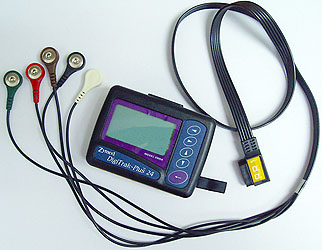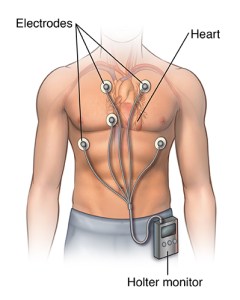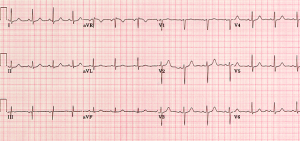What is Holter Monitor?

Example of a Holter Monitor
A Holter monitor is a small portable device used to record the electrical activity of the heart. A Holter monitor is typically worn for 24 hours to record each heart beat during your normal daily activity. This is performed to detect any irregular heart rhythms that may not be picked up on a routine electrocardiogram (EKG) during your office visit.
Who needs it?
- Arrhythmia (irregular heartbeat)
- Atrial Fibrillation/ Flutter
- Atrial tachycardia
- Palpitations
- Supraventricular tachycardia
- Syncope
- Bradycardia (slow heart rate)
- Ventricular Tachycardia
- After a heart attack
- New cardiac medication usage
How do I prepare for the test?
There is no specific preparation before having a Holter monitor put on. Make sure to shower before the test as you will not be permitted to while wearing the monitor.
The test is a painless test. Most people do not notice they even have the monitor on.
There is no risk associated with this test. It is important to avoid getting the device wet, as it is an electrical device. Some things to avoid during the 24 hours include electric blankets, high-voltage areas, magnets, and metal detectors.
How is it performed?
Several small sticky electrodes will be placed on the chest and attached to the Holter monitor. These can easily be hidden under your clothes. The Holter monitor is small enough to attach to your belt or may be worn around the neck or waist. The Holter monitor will be worn for 24 hours throughout your normal daily activities including exercise, eating, sleeping, and even when you take your daily medications. It is important to make a diary of your activities. Make sure to include the time of day of each activity. Any symptoms you might feel should be accurately recorded. After 24 hours, the monitor and diary must be returned to our clinic.
How are results interpreted?
The events recorded from the Holter monitor will be compared to your daily activity diary as well as any symptoms you may have noted. The results of the test may reveal normal cardiac activity.
If your symptoms are so infrequent that a 24 hour monitor does not reveal any abnormal activity, an event monitor may be issued for the next 30 days. The events recorded in a 24 hour monitor may help reveal a present heart condition. Further management can be done following this.
Call our office:
- Holter monitor makes a noise
- If an electrode comes off


